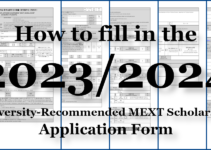Questions about the MEXT scholarship? Ask them in the comments here or on the individual FAQ pages listed below!
FAQs Released so Far
Here are the links to the existing pages:
- MEXT Scholarship Application Basic Information (Where to apply, etc.)
- Contacting Professors (Embassy-Recommended MEXT Scholarship Application)
- Field of Study and Research Program Plan
- University Recommended MEXT Scholarship Application
Explanation
Given the recent volume of questions, I am afraid that I no longer have the time to answer each emailed question one-by-one and get you the response you want in a timely manner.
Instead, I will group similar questions and answer them in the subject-by-subject FAQ articles linked above.
Live Q&A?
Once TranSenz reaches $50 in monthly support on Patreon, I will start a monthly live video Q&A. If you are interested in supporting this effort, or simply getting faster responses to your questions and access to articles ahead of everyone else, you can become a patron of TranSenz for as little as $2 per month!
Get All the Answers, Fast
When you sign up for my MEXT Scholarship Mailing List, I will send you my sample MEXT application forms as well as a email course introducing you to the essentials of the MEXT scholarship application, step-by-step.
Tips to Get Your Questions Answered Faster
There are some ways you can get your question featured faster:
- Be clear. Let me know what type of application process (Embassy/University/Domestic Selection) you’re asking about, what level (Undergraduate/Graduate), what year, and any other relevant details. If I have to guess what you mean – or write back to you to ask you to clarify your question, it’s going to take more time.
- Be detailed. If your question is “Please help me with the MEXT Scholarship application” or “I don’t know where to start,” then read through the articles that exist on this site first. Specific questions that are easier to understand and research will get answered first. If your question seems like it’s asking for a half-hour sit-down chat, then it’s probably not possible for me to answer in the FAQ.
- Be original. If there is an FAQ for your question already, please watch/read what I have posted in there already. If you ask a question that’s just been answered, it will take me longer to circle back to it.
- Don’t be selfish. Questions that can help more people will get answered first. If your question is specific to only your case, it’s going to take me longer to get to it.
Can’t Wait?
If you’re really in a hurry, you can join the community of TranSenz Supporters on Patreon. These are people who generously donate to help me cover the site costs and production expenses for this website for as little as a few dollars a month.
As one small way of expressing my gratitude to them, I answer their questions on a priority basis, including individual questions.
If you are interested in becoming a TranSenz supporter (whether or not you want faster answers), you can get all of the details here.
Subject Specific FAQs
As I release and publish new Q&As and Q&A videos, I will post each of them on a separate page for that subject. Before posting a new question, please check to see if it’s already been answered, to save yourself some time!
If you can’t find an answer, you can post your question in the comments on the subject-specific page or on this page.
Ads by Google:






Hello! I have a question about choosing majors for undergraduate application form. There is 3 choices but I don’t like most of the majors mentioned in the guideline. Is it possible to choose one or at least 2 majors?Hello! I have a question about choosing majors for undergraduate application form. There is 3 choices but I don’t like most of the majors mentioned in the guideline. Is it possible to choose one or at least 2 majors?
Hi P,
The application guidelines say that you “may” choose a first, second, and third choice, so that suggests that you may choose only one or two, if you prefer. (The Japanese version is clearer and says that you may choose up to three choices.)
Good Luck!
– Travis from TranSenz
Hey Travis,
I hope you’re doing well. I have a question about the MEXT scholarship application, specifically regarding the research plan. The instructions say the plan should be within two pages, but half of the first page is filled with instructions. Does that mean I have 1.5 pages for the content? I’ve seen conflicting examples, so I’m wondering if you have any insights or experiences with this requirement.
Thanks in advance for your help!
Hi Elena,
My advice is that the half-page of instructions counts toward your 2-page limit, but recently, I have heard of some consulates allowing applicants to write two full pages, by deleting the instructions or attaching their FSRPP as a separate document to the form. I can’t say for sure if that would be the case for you, so you would need to check with the embassy/consulate directly.
On the other hand, I have never seen an FSRPP that needed more than the 1.5 pages allotted. Most of them just need editing to remove unnecessary parts and increase the focus.
Good Luck!
-Travis from TranSenz
I would like to ask two questions.
1/ I am working in a public institution. Can I get only a reference letter from my director without a reference letter from the dean/present from the university where I attended?
1/ Regarding English proficiency, the requirement is equivalent IELTS 6.5. I get BA in English linguistics and literature in Vietnam. Could I use it rather than ELTS 6.5?
Thank you very much.
Hi Nguyen Thanh Tai,
1. No, you need to submit a letter of recommendation from the university you last attended.
2. MEXT does not have a minimum English language proficiency requirement for the Embassy-Recommended MEXT Scholarship, so I don’t think you would need a replacement for that part of the application. (You will take an English language proficiency test during the primary screening). If the requirement comes from a university that you want to apply to, then it would be up to their discretion. If your degree was entirely taught in English, that is often considered sufficient proof of language ability by Japanese universities, but if it was a degree in English linguistics and literature that was taught in Vietnamese, that might not meet their requirements.
Good Luck!
– Travis from TranSenz
Hello Travis,
I have two questions regarding the scholarship. It is very kind of you to give your valuable opinions about them.
1. Concerning the graduation thesis, is a one-page abstract enough?
2. Concerning the study and research plan, could we write about 3-4 pages since their file mentions that “Both a single-side and dual-side printing will be acceptable”. I mean for the PDF (online) version, not the printed one.
I really appreciate any help you can provide.
Best wishes,
Morteza
Hi Morteza,
1. One page is the longest your thesis abstract should be, but it can be shorter if you can cover the important points in that space.
2. No. The maximum is “2 pages”, not “2 sheets of paper front and back”. You could print the two pages on one sheet of paper front and back, or on two sheets of paper, leaving the back side of both blank.
Good Luck!
– Travis from TranSenz
Sir I’mfrom india, studying in 11th so i have some time but i have a question, our results of 12th examination are out on May but mext application starts from April so how can i attach my results in the mext application form??
Hi Islam Khan,
You should attach the most recent results you have at the time of the application deadline, even if they are not the final results.
While the application process starts in April (that’s when the guidelines typically come out), the deadline usually isn’t until late May, so your final results may even be in time.
Good Luck!
– Travis from TranSenz
Hello , Travis!!! Thank you for your great job and your willing to help all the applicants. As a person who is going to apply for research student program (masters), I couldn’t find any information about passinfg the qualifying examination(Eglish, Japanese), so my question is what is the minimal passing score or percentage for both of them? Since it’s definitely not least important information I would be happy to know it.
Thank you in advance!!!
Hi Adele,
There is no official minimum passing score. You should try to do as well as possible to score better than the other applicants.
The Japanese test is only really critical if you’re applying for a program taught in Japanese (you are still required to attempt it in either case) and the English test is only required if you are applying to a program taught in English.
I have an article about the MEXT Scholarship tests including links to past exams that might help you prepare.
Good Luck!
– Travis from TranSenz